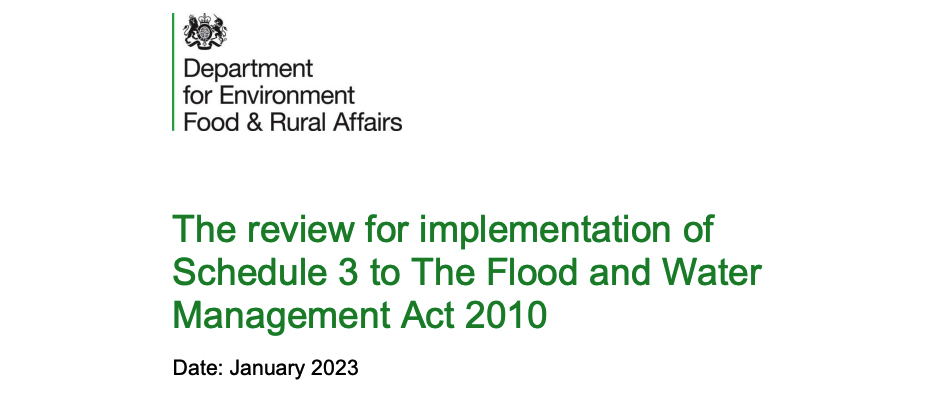New approach to sustainable drainage set to reduce flood risk and clean up rivers
A consistent approach to sustainable drainage systems is set to be incorporated into new developments in England. New developments and the environment will benefit from a reduced risk of flooding and pollution.
The recommendation to make sustainable drainage systems mandatory to new developments in England is the result of the Government’s Sustainable drainage systems review on January 10 2023. This will reduce the risk of surface water flooding, pollution and help alleviate the pressures on our traditional drainage and sewerage systems.
New developments can inadvertently add to surface and sewer flood risk by covering permeable surfaces like grassland and soil that would otherwise assist in dealing with heavy rainfall.
The new approach to drainage will ensure sustainable drainage systems are designed to reduce the impact of rainfall on new developments by using features such as soakaways, grassed areas, permeable surfaces and wetlands. This reduces the overall amount of water that ends up in the sewers and storm overflow discharges. Certain features such as tanks and water butts also allow for water reuse and reduce pressures on water resources.
Following publication of the review, regulations and processes for the creation of sustainable drainage systems at new developments will now be devised, through the implementation of Schedule 3 to the Flood and Water Management Act 2010. Implementation of the new approach is expected during 2024.
Environment Minister Rebecca Pow said: "Our traditional drainage systems are under increasing pressure from the effects of climate change, urbanisation and a growing population. The benefits of sustainable drainage systems are many – from mitigating flood risk by catching and storing surplus water and reducing storm overflow discharges, to enhancing local nature in the heart of our developments and helping with harvesting valuable rain water. Taking a more consistent and effective approach to sustainable drainage systems will improve the resilience of our drainage and sewer infrastructure, while reaping these broader benefits."
Schedule 3 provides a framework for the approval and adoption of drainage systems, a sustainable drainage system approving body within unitary and county councils, and national standards on the design, construction, operation, and maintenance of sustainable drainage systems for the lifetime of the development. It also makes the right to connect surface water runoff to public sewers conditional upon the drainage system being approved before any construction work can start.
Government will now give consideration to how Schedule 3 will be implemented, subject to final decisions on scope, threshold and process, while also being mindful of the cumulative impact of new regulatory burdens on the development sector. This will include a public consultation later in 2023, which will collect views on the impact assessment, national standards and statutory instruments.
This article is based on a press from the Department for Environment, Food & Rural Affairs and Rebecca Pow MP entitled "New approach to sustainable drainage set to reduce flood risk and clean up rivers" January 20 2023.
[edit] Related articles on Designing Buildings
Featured articles and news
Latest Build UK Building Safety Regime explainer published
Key elements in one short, now updated document.
UKGBC launch the UK Climate Resilience Roadmap
First guidance of its kind on direct climate impacts for the built environment and how it can adapt.
CLC Health, Safety and Wellbeing Strategy 2025
Launched by the Minister for Industry to look at fatalities on site, improving mental health and other issues.
One of the most impressive Victorian architects. Book review.
Common Assessment Standard now with building safety
New CAS update now includes mandatory building safety questions.
RTPI leader to become new CIOB Chief Executive Officer
Dr Victoria Hills MRTPI, FICE to take over after Caroline Gumble’s departure.
Social and affordable housing, a long term plan for delivery
The “Delivering a Decade of Renewal for Social and Affordable Housing” strategy sets out future path.
A change to adoptive architecture
Effects of global weather warming on architectural detailing, material choice and human interaction.
The proposed publicly owned and backed subsidiary of Homes England, to facilitate new homes.
How big is the problem and what can we do to mitigate the effects?
Overheating guidance and tools for building designers
A number of cool guides to help with the heat.
The UK's Modern Industrial Strategy: A 10 year plan
Previous consultation criticism, current key elements and general support with some persisting reservations.
Building Safety Regulator reforms
New roles, new staff and a new fast track service pave the way for a single construction regulator.
Architectural Technologist CPDs and Communications
CIAT CPD… and how you can do it!
Cooling centres and cool spaces
Managing extreme heat in cities by directing the public to places for heat stress relief and water sources.
Winter gardens: A brief history and warm variations
Extending the season with glass in different forms and terms.
Restoring Great Yarmouth's Winter Gardens
Transforming one of the least sustainable constructions imaginable.
























Comments
[edit] To make a comment about this article, click 'Add a comment' above. Separate your comments from any existing comments by inserting a horizontal line.